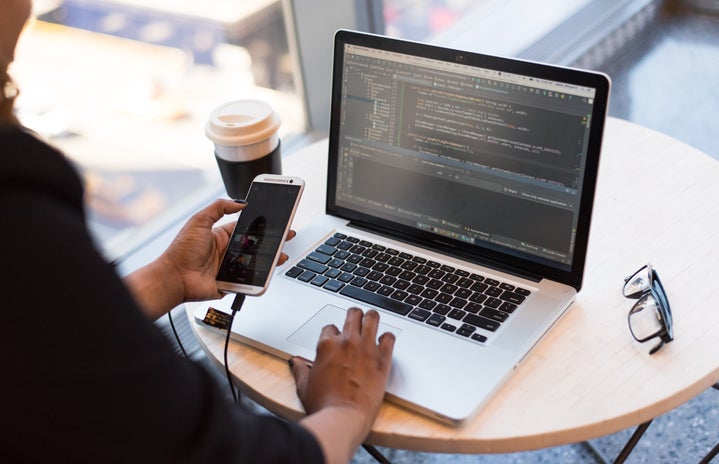Edited by: Vlada Taits
As most of us are continuing work and studies online this new year, it is important that we understand the negative effects technology has on our bodies. I am sure you all have experienced back pain, lack of motivation, and irregular sleep schedules due to “zoom university”. While these problems are important to address, in this article I am going to discuss the ways in which blue light can negatively affect our eyes and some tips on how to overcome these consequences.
What is Blue light?
Blue light is one of the colours on the visible light spectrum. Red light has the longest wavelength but the least amount of energy. Blue light on the other hand has a very short wavelength and lots of energy. Blue light is most commonly thought of as being emitted from our electronic screens such as smartphones, tablets, and even LED lighting. A major source of blue light is actually emitted from sunlight but don’t worry sunlight isn’t dangerous and is in fact beneficial to health. Blue light that is released from our screens can cause more consequences than that of the sun because these screens are kept very close to our eyes for long periods of time.
What are the negative effects of prolonged exposure to blue light?
Blue light has been linked to causing permanent vision damage. This is because the eye is not equipped to handle filtering blue light and as a result blue light rays that are emitted from screens penetrate into our eyes, damaging the cells in our retinas. Blue light has also been known to cause eye strain. Have you ever tried to focus on an online reading for one of your classes and needed to squint your eyes in an attempt to focus on the words better? Or have you ever experienced a horrible headache accompanied by pain around your eyes after looking at a screen for some time? If you have, then chances are you have experienced digital eye strain. Since blue light has a shorter wavelength, it has more energy and therefore can scatter more on the screen leading to this unwanted eyestrain.
Is there anything that can reduce Blue light impact?
I’m glad you asked. Although blue light seems to be all around us as we transition to virtual classes, meetings, and activities, there are still ways that you can reduce the effect blue light has on your eyes. One of the ways is located in your device settings. On both Apple and Android products, on the settings page, you have the option to turn on “ night mode” or “ night shift”. When you enable this feature, it decreases the amount of blue light released and instead gives your screen an orange tint or “warmer” colour if you will. You can also schedule the time this feature is enabled. I suggest setting it 2-3 hours before bed to limit the amount of disruption your screen will have on your sleep schedule. Another solution is to use blue light filters. These act like screen protectors, but with the added bonus of lowering the amount of blue light that emits from your screen, providing a long term solution. You can find many packs on Amazon or at your favourite tech store for all your devices. Also, you can also invest in blue light glasses. You can add this as an additional feature to your prescription reading glasses or you can find many pairs on Amazon. Since we are dealing with eye strain it is important to remember the 20-20-20 rule. This rule states that every 20 minutes of online work, look at an object 20 feet away from you for 20 seconds. This allows your eyes to relax from working on digital screens all day since the muscles become very strained.
Is Blue light really all that bad?
No, blue light actually has some benefits in moderation. For example, blue light is linked to elevating mood, alertness, and increasing cognitive abilities. When you limit the amount of screen time you use around your sleep schedule, blue light can also help regulate your natural rhythms and allow you to feel alert during the day and sleepy at night for a good night’s rest.
It’s important to take care of both our bodies and minds and be on alert to any risks that can threaten the health of them. Your eyes play the important role of allowing you to see the beauty this world has to offer, so let’s try to protect them.
https://opto.ca/health-library/blue-light-is-there-a-risk-of-harm
https://www.mayoclinichealthsystem.org/hometown-health/speaking-of-healt…
https://preventblindness.org/blue-light-and-your-eyes/#:~:text=Symptoms%….


